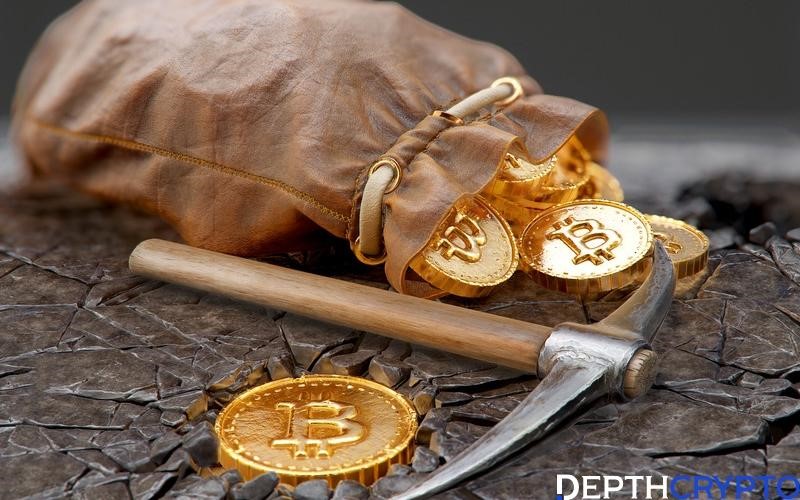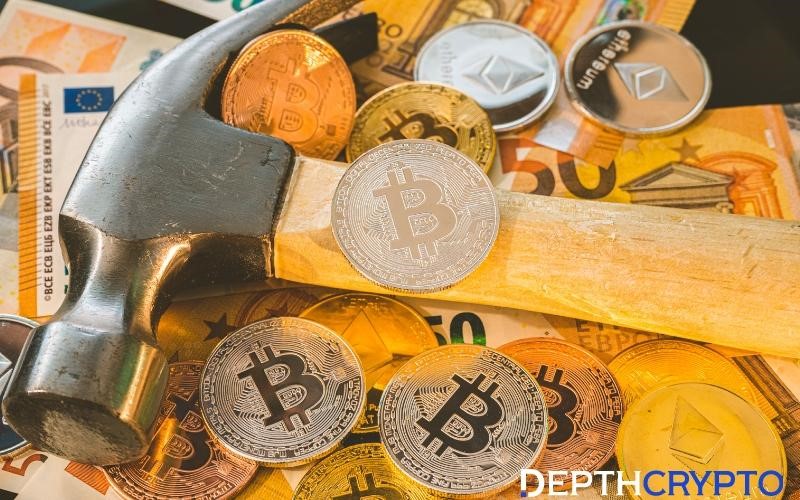
Have you ever wondered how Bitcoin has remained in circulation since 2009? What abracadabra happens at Bitcoin’s backend? Well, the answer is simple. Bitcoin Mining. (As if that explains it any better).
Wait for a second, will you, as I explain further? Unlike your native currency, Bitcoins are not printed; they’re created.
Bitcoin mining is the creation of new Bitcoins and releasing them into circulation. There you have it.
Okay, so what? Why should you be concerned?
I’ll tell you why.
By mining Bitcoin, you contribute to securing and maintaining the “almighty” Bitcoin network.
The juiciest part is that you earn 6.25 BTC (approximately $ 105,472, as of writing time) for each new block you create.
Do I have your attention now? Oh, yeah!
If you want to know how, continue reading this comprehensive guide as I lay out how Bitcoin mining works, how to mine Bitcoin, the cost of mining Bitcoin, and if Bitcoin mining is legal.
What is Bitcoin mining?

Bitcoin mining is the process of creating and releasing new bitcoins into circulation. It also involves creating valid blocks with records of all transaction history on Bitcoin’s blockchain. It is a critical component that enables Bitcoin’s operations to run smoothly.
The people or computers that participate in creating or mining Bitcoins are called Miners.
Mining requires the use of sophisticated hardware that solves complex mathematical puzzles. The first miner to solve the puzzle gets to validate the next bitcoin block. After which, the process starts again.
Even though Bitcoin mining has maintained an excellent reliability record, it has also received backlash due to the crazy amount of energy required to validate and create new blocks.
Bitcoin mining, which uses the energy-hungry mechanism (proof-of-work), requires 1,449 kWh to validate a block across the Bitcoin network— about the same electricity that powers the average US household for 50 days.
According to Forbes, Bitcoin uses an estimated annual electrical energy of 127 terawatt-hours (TWh) [1].
How does Bitcoin mining work?
Mining Bitcoin, like other cryptos, is a competitive process because of its economic incentives. It rewards users for providing accurate and reliable ways of ordering data on the blockchain network.
As a result, Bitcoin mining produces a succession of blocks stacked in the correct order.
In Bitcoin mining, the entire process depends on the computational features of a cryptographic hash — a method of encrypting data.
Bitcoin miners go through trillions of hashes every second until they find a hash puzzle that fulfills the difficulty level. The hash and difficulty levels are huge numbers depicted in bits. However, the difficulty level is expected to be higher than the hash puzzle.
After every two weeks or the creation of 2,016 Bitcoins blocks, the difficulty level is designed to increase. This is to maintain an efficient block time (the time required to find a new block during mining).
For every transaction input, mining software forms an uncommon cryptographic hash puzzle challenging to crack. The hash puzzle is used to identify specific blocks. The software then merges the transactions needed to create a block into a hash or Merkle tree.
A Merkle tree shows all the transactions in a block. It’s like a data structure containing the cryptographic hashes in a block. The Merkle tree facilitates the smooth verification of transactions across the bitcoin Blockchain.
Changing anything in a block would visibly change its hash and the hashes of neighboring blocks. Miners instantly reject such changes to protect the network from alteration and hacks.
To solve the hash puzzle, miners compete to be the first to solve the challenge. Solving a puzzle takes about ten minutes (for a winner to emerge). Once a miner gets it right, a new block is created and validated in the network after reaching a consensus among the computer nodes.
Thus, a new Bitcoin is released into circulation. Mining Bitcoins works differently from how other major cryptocurrencies like Ethereum are mined.
What do you need for Bitcoin mining?
The most important step is to fulfill the mining requirements such as setting up the following:
- Your crypto wallet to keep your Bitcoin gains.
- Mining software such as Pionex, BeMine, Kryptex Miner, Easy Miner and ECOS, and Awesome Miner.
- Sophisticated mining Hardware such as ASIC (application-specific integrated circuit), GPU (graphics processing unit), SSD for crypto mining, or the recent FPGA (Field Programmable Gate Array) chips.
- A chosen mining pool (if you aim to use a mining pool instead of going solo). Bitcoin mining pools refer to combining your mining efforts with other miners. You have more chances of mining Bitcoin, earning rewards, and sharing the gains. Note that you’ll pay a certain fee to join a mining pool.
How to Mine Bitcoin at Home?
Bitcoin mining is highly competitive and energy intensive. While anyone can mine Bitcoin, not everyone will do so because it’s an expensive setup.
Even though mining Bitcoin at home is arduous, it’s doable. You’ll need to buy powerful ASIC Bitcoin hardware to obtain good results, which costs more than $10,000.
You also need a top-notch internet connection, mining software, a crypto wallet, and a mining pool.
Once your mining equipment is available and ready, set up your mining software and input your wallet details and the mining pool information.
Because Bitcoin mining consumes insane electricity, mining from home may not be as profitable due to high electricity bills and regulations.
In addition, ASICs are often too loud and can quickly overheat if not properly cooled.
To determine whether mining from home is good for you, consider using an online Bitcoin mining calculator that checks your expenses, such as electricity costs and other factors.
Instead of solo mining, combining your computational power with others in a pool is another way you can increase your chances of mining Bitcoin from home.
Once a block is mined, the block reward is shared among all the computers in the pool according to their contribution.
You can also consider cloud mining, which allows you to rent or lease computing power from a third party.
Why mine Bitcoin?
You can decide to mine Bitcoin for the following reasons:
- Earn a profit.
- Experiment and learn about the technology.
- Support and contribute to Bitcoin’s network.
Is Bitcoin mining worth it?
Bitcoin mining is a heavy investment due to expensive hardware and equipment purchase. Whether or not it is worth your efforts depends on several factors. You’ll need to carry out a cost-benefit analysis to determine your stance. A cost-benefit study is a systematic approach that helps determine if an action should be initiated or declined.
How to calculate Bitcoin profit?
Your profit depends on several reasons, such as:
1. Bitcoin’s market value
Bitcoin has had a choppy and volatile trading history. Bitcoin’s price has a direct impact on your ROI. During bull markets, Bitcoin price may surge, increasing BTC dollar value. However, it’s the opposite during bear markets.
For instance, Bitcoin’s price went from an all-time low of $.09 in July 2010 to an all-time high of $67,566.83 on November 8, 2021. And as of November 19, 2022, Bitcoin goes for $16,624.74 apiece [4].
Since Bitcoin is designed to have limited supply, in a few years, it’s more likely that Bitcoin’s price will skyrocket.
2. The Time length
This is intuitive. If you mine Bitcoin 24/7 and your friend does 24/5, you have the chance to mine more blocks and, thus, earn more Bitcoin rewards.
3. Cost of Power
Electricity consumption is one of the major profit determinants. It’s required to mine Bitcoins and stop the system from overheating. Due to the colossus electric bill, many miners use a location where electricity bills are cheap.
4. Choice of hardware
How powerful and sophisticated is your mining equipment? If you encounter low voltage or slowing computers, your chances of solving puzzles reduce, impacting your Bitcoin profit.
5. Presence of other miners
Mining Bitcoin is highly competitive. The more miners on the network, the more challenging the competition. Furthermore, the types of equipment other miners use can give them edges above you.
Is Bitcoin mining legal?
Bitcoin mining may be legal or prohibited depending on your jurisdiction’s laws.
In places like Iceland, Israel, and the US (some parts of the US), Bitcoin mining is legal. For instance, Enigma, an Iceland-based firm, launched one of the world’s most extensive Bitcoin mining operations. Bitcoin mining in such places is subject to tax.
However, in places like China, Pakistan, Iraq, Russia, Egypt, Nepal, Morocco, Algeria, Bangladesh, Qatar, and Ecuador, Bitcoin mining is illegal and banned.
Before proceeding, check what rules govern Bitcoin mining in your location.
How much do Bitcoin miners earn?
By design, the Bitcoin reward halves every four years. This is because only 21 million Bitcoins were designed according to Bitcoin open source ever to exist.
As of press time, there are currently 19,208,925 Bitcoins in circulation [2]. The number changes about every 10 minutes when new blocks are mined.
By 2040, the Bitcoin reward will have reduced to $0.2 BTC with about 80,000 Bitcoins left.
During the Bitcoin years starting in 2009, your reward for mining a block is 50 BTC. In 2019 the reward was slashed into two; thus, you get 25 BTC. In 2016, the reward was cut into two (12.5 BTC). Another four years down the lane, On May 11, 2020, the Bitcoin reward was halved to 6.25 BTC.
As of November 2022, when the price of Bitcoin was $16,750.06 apiece [3], your Bitcoin reward for mining one block is (6.25 x 16,750) $104,687.
The downside and risks of mining Bitcoin
Bitcoin mining is not always a bed of roses. Like every other thing, Bitcoin mining has its fair share of limitations, such as:
1. No guarantee of success
Although bitcoin mining has potential, it doesn’t guarantee your success. You could cough out the massive investment on equipment and setup and end up with no ROI.
2. Bitcoin, like other cryptocurrencies, lacks legal protection
Even though Bitcoin’s decentralized nature comes with many benefits, its lack of legal protection could be detrimental in times of loss.
3. Fluctuating market
Cryptocurrencies are generally highly volatile and speculative assets. You’re always watching your back and crossing your fingers for prices not to plummet.
4. Irreversible transactions
Due to Blockchain’s immutable technology, you can’t reverse transactions. For instance, if you send money to the wrong address, there’s little you can do.
5. o worldwide acceptance
Even though the crypto market exploded to a $1.1 trillion industry, it’s still not yet accepted worldwide as a legal tender.
6. Environmental impact
Because of the insane amount of energy Bitcoin mining consumes, it’s been flagged as unsafe for the environment. t is also unlikely that Bitcoin will reduce its energy footprint.
Conclusion
Mining Bitcoin serves you through block rewards and also helps the ecosystem. Bitcoin mining keeps the Bitcoin network secure, stable, and reliable.
FAQ
How Long Does It Take to Mine 1 Cryptocurrency?
In Bitcoin, it takes about 10 minutes to mine one Bitcoin block plus a block reward of 6.25 BTC, which is $104,687.5 as of writing time.
However, on Ethereum and other cryptos, which use a faster, more energy-efficient Proof-of-stake model, it takes a matter of seconds to mine one Ethereum block.
How do you join a bitcoin mining pool?
First, you need to set up your preferred mining hardware. The second step is to download the mining software. You can then sign up with a free or paid pool. f you join a paid pool, you’d be required to pay a substantial amount.
Can You Get Rich by Crypto Mining?
The answer is YES if you asked this during Bitcoin’s early years.
However, due to the extreme competition and mining difficulty, crypto mining is more favorable for people who can incur large-scale mining operations.
Meanwhile, you can still make good money from mining crypto if you’re not looking to be Elon Musk-rich.
Does Crypto Mining Damage Your GPU/Computer?
Crypto mining is highly energy-intensive, exposing your hardware to extreme conditions. Continuous exposure could cause your mining rig to explode.
However, maintaining a moderate pace and adequate electricity is generally safe.
Can You Mine Bitcoin on Your iPhone?
Hell No. Bitcoin mining requires crazy amounts of computing power and even more crazy electricity. Mining Bitcoin on your phone is unfeasible.
[2] Statista. (2022c, November 16). Bitcoin (BTC) circulating supply history up until November 14, 2022. https://www.statista.com/statistics/247280/number-of-bitcoins-in-circulation/
[3] Jakobson, L. (n.d.-b). Bitcoin price today, BTC to USD live, marketcap, and chart. CoinMarketCap. https://coinmarketcap.com/currencies/bitcoin/
[4]. Jakobson, L. (n.d.-c). Bitcoin price today, BTC to USD live, market cap, and chart. CoinMarketCap. https://coinmarketcap.com/currencies/bitcoin/historical-data/
